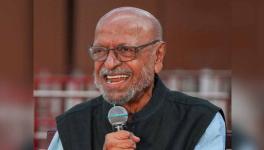Aamir Khan in Turkey: Soft Power or Embarrassment for India?
In August 2010, during a trip to Germany, I was browsing souvenirs at an antique and memorabilia store in Berlin when the shopkeeper suddenly asked me: “Are you Indian?” As I answered in affirmative, he grinned, “My name is Khan,” referring to the year’s blockbuster from the then “King of Bollywood”. We spoke briefly about Shahrukh Khan and Indian films and when I left, the owner of the store presented me with a small statue of Buddha.
When I shared this experience with German friends, they told me about the growing popularity of Indian films there. Those days, a German TV channel was broadcasting Hindi films with German subtitles every Sunday.
Bollywood as single largest source of cultural diplomacy:
Indian films in general and Bollywood in particular have been a great source of India’s cultural diplomacy. Indian films have had huge followings from Afghanistan to Azerbaijan and Malaysia to Morocco, and not just among the Indian diaspora.
Like Raj Kapoor, Dilip Kumar and Amitabh Bachchan in previous decades, the Khans became the biggest cultural ambassadors of India, other than actors like Akshay Kumar, throughout the 1990s and first decade of the current millennium.
The economic changes of the 1990s provided Bollywood with new audiences in the West. Film-makers such as Subhash Ghai and the Yashraj banner brought Switzerland, the United Kingdom, United States and Canada to the Indian silver screen. Shahrukh Khan, in particular, became the uncrowned badshah who ruled over the hearts of hopeless romantics and fans of the Hindi film industry.
Shahrukh has not been as lucky in the last decade, but Taare Zameen Par, Three Idiots and Dangal have allowed Aamir Khan to chart a new course. Besides mesmerising domestic audiences, these films of his were instant hits from China to Turkey. Perhaps people everywhere can connect with the struggles of the underdogs he portrays on-screen.
Hindi films and Aamir Khan in Turkey:
As Turkey’s AKP government headed by Recep Tayyip Erdoğan steadily tilts the country towards public display of Islam—in contrast to Kemalite secularism—Aamir Khan’s 2014 film, PK, found resonance among audiences in Turkey. This was the first film produced in India to gross more than $100 million worldwide, and it also became the highest-grossing film ever produced in India. The film’s theme is relevant to the question of its popularity in Turkey (and India): Aamir Khan’s character, an alien on a visit to Earth, questions religious dogma and superstition through its plot.
In 2017, an article in Turkish, “Is Aamir Khan the new (Raj) Kapoor?” analysed the two Bollywood actors and the relevance of their filmic personas in the context of Indian social concerns, especially secularism. The article elaborated on how Aamir Khan’s films make “more secular proposals” and tended to resolve “the religious identities debate in favour of the state [but] on a common ground.” The article also notes that the Indian “melodrama tradition is close to the viewing pleasure of the Turkish audience” and that online platforms are making Indian films more easily accessible in Turkey as well.
I chanced upon a young couple in 2018 at the mausoleum of the Mustafa Kemal Atatürk in Ankara. They were there for their pre-wedding shoot. The bride was so enamoured of Bollywood weddings that she had searched for a dress online in that style, and ordered it months in advance of her wedding. An Indian friend studying in Konya, the city famous for Mevlana Rumi, also told me that young women often stop to ask her beauty tips when they realise she is Indian. “Somehow, Turkish women have come to believe that Indians have dark silky hair because they apply coconut oil to it. That is why coconut oil is a highly-priced product here,” she told me.
The past few years have seen more Indian tourists visit Turkey as well, particularly Istanbul and other touristy and historical places. Besides, the two countries conducted bilateral trade worth over US$ 8.6 billion in 2018. In the above context, the reactions of India’s Twitterati to a tweet by the First Lady of Turkey Emine Erdoğan on 15 August, announcing her meeting with “the world-renowned Indian actor, film-maker, and director in Istanbul,” are rather puzzling. Aamir Khan has been in Turkey to scout for locations for his upcoming film, Laal Singh Chaddha. The Indian ambassador in Ankara Sanjay Panda called the reception to “India’s Cultural Ambassador and one of our finest exponents of meaningful cinema” a “special moment”.
Aamir Khan faces backlash:
As photographs and videos of the actor greeting the First Lady went viral in India, the right-wing troll army began accusing him of exchanging pleasantries with the wife of an “enemy”. Khan has been labelled an extremist and accused of aiding the allegedly nefarious intent of Turkey towards India. Old videos and comments in which he had been even slightly critical of the present government were pulled up and shared, not just by trolls but by well-known journalists and politicians. Prime time TV discussions dissected Khan’s meeting in Turkey from every possible angle. The Indian envoy was not spared either.
Although Aamir is not oblivious to controversies—they somehow find him before every film—the actor and India’s ambassador would surely have been taken by surprise by the backlash at home.
Recent setbacks in bilateral relations:
What has miffed India in recent years is the constant criticism of the Modi government’s Kashmir policies by the Turkish establishment, including Erdoğan himself. The reportage on domestic affairs in India in the Turkish media has largely been negative in recent years, like most of the international press. If recent media reports are to be believed, the Indian agencies have suggested that Turkey is collaborating with Pakistan to destabilise India. In fact, “lucrative scholarship” schemes of the Turkish government have also been put in the dock for wooing “Indian Kashmiri and Muslim students”, ignoring the fact that very few Indian students go to Turkey. According to the Indian Embassy in Ankara, as of September 2019, just over 60 Indians are students in Turkey, besides a small community of skilled workers, mostly in Istanbul.
No doubt Ankara has regional ambition. It is headed by a strongman who is trying to exert influence in the neighbourhood. Turkey under Erdoğan has used Islamic history and culture (through TV series like Ertuğrul, now available on Indian Netflix) to spread its cultural influence, particularly in the Muslim world. It has generated controversy with recent moves such as the conversion of Hagia Sophia into a mosque. But the hostility towards Turkey displayed by Indian netizens after the Aamir Khan meeting does not appear to be based on a rejection of Erdoğan’s brand of politics.
For instance, there were frankly illogical suggestions that Ankara has territorial and political ambitions in India, a view that does not take into account how much Turkey’s economy is suffering at the moment. Erdoğan’s Turkey has not emerged from a 2018 debt crisis and is facing a currency crisis. In addition, Turkey’s attempts to resolve the crises in Afghanistan and neighbouring Syria too have failed. Nonetheless, to consolidate its support base, Erdoğan does indulge in vituperative rhetoric, particularly on issues concerning Muslims, such as the Rohingya crisis, the Palestine issue, as well as Kashmir.
But New Delhi itself had invited Erdoğan to India in 2017, and he came with a powerful business delegation. Is it now the case that New Delhi wants to reduce diplomacy and international relations to a zero sum game? For, it was evident that troll armies were also behind the concerted attack on Aamir Khan. India has to decide whether the Khans—who were until recently seen as cultural ambassadors—still enjoy that coveted role in a so-called New India? The more important question than Aamir Khan shooting a film in Turkey is whether India wants to continue with domestic policies which have received strong negative reactions abroad. Or does it plan to just shrug off criticism and declare war on anyone critical of it?
The author is an assistant professor of journalism at Aliah University, Kolkata, and is working on an ICSSR-sponsored project on public diplomacy. The views are personal
Get the latest reports & analysis with people's perspective on Protests, movements & deep analytical videos, discussions of the current affairs in your Telegram app. Subscribe to NewsClick's Telegram channel & get Real-Time updates on stories, as they get published on our website.
























